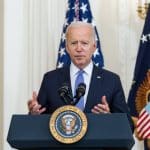President Joe Biden felt compelled to weigh in on the recent tragedy in New Orleans that claimed the lives of 14 people, making a statement that seemed to be more about political optics than substance. While he condemned the attack, he also indicated that the FBI would take the reins on the investigation. This begs the question: what are they really investigating, and why do some officials seem to be tripping over their own words? Perhaps one shouldn’t hold their breath for any real answers.
Adding to the confusion, an FBI official made headlines for initially stating that the attack wasn’t an act of terrorism. Assistant Special Agent in Charge Alethea Duncan must have missed the memo about the ISIS flag proudly displayed on the back of the assailant Shamsud-Din Jabbar’s rented truck. Clearly, she had a different definition of terrorism, or someone was banking on the public’s penchant for blind trust in federal agencies. Parroting that an attack involving explosives and affiliations with ISIS isn’t terrorism raises serious doubts, and it doesn’t take a rocket scientist to figure that out.
The FBI Agent in charge of New Orleans said the guy who drove over dozens of people with IEDs and an ISIS flag on his truck was not a terrorist.
The New Orleans Police Chief said she was unaware of having barriers that would have prevented the attack.
👉DEI HAS TO GO!👈 pic.twitter.com/fLnmPcmUmx
— Willie D 🙏✝️ Praying For America🇺🇸 (@WillieDMack1) January 3, 2025
Social media erupted in disbelief over the FBI’s attempts to pooh-pooh the obvious. Conservative commentators, ever watchful, pointed out the absurdity of trying to downplay the attack when the evidence was loud and clear—an ISIS flag on display. Dinesh D’Souza, in his typically frank style, remarked that the statement sounded like it came from someone grappling with a mere grasp of language rather than from an FBI agent. It’s as if they were trying to rewrite the definition of “terrorism” while avoiding the harsh realities right in front of them.
The FBI eventually backtracked, acknowledging that Jabbar’s actions were indeed an act of terrorism, although they did not provide any clarity regarding Duncan’s initial comments. Their statement claimed they were aggressively pursuing all leads while taking the lead on the investigation. This is a classic example of bureaucratic double-speak, leaving many to wonder whether there’s a concerted effort to downplay the attack due to its implications. The real question is whether real accountability will come from this, or if it will be swept under the rug like so many other inconvenient truths.
As if the FBI knew it needed to demonstrate some semblance of authority, they issued a joint bulletin with the Department of Homeland Security. This advised law enforcement agencies to be on high alert for potential copycat attacks inspired by Jabbar’s actions. The bulletin went on to outline the ways attackers might continue their rampage using secondary weapons, but how comforting is it that the agencies charged with keeping the public safe seem more focused on catching up than preventing future carnage? It’s a classic case of government reacting rather than acting—a theme that has become all too common in today’s world of law enforcement.




